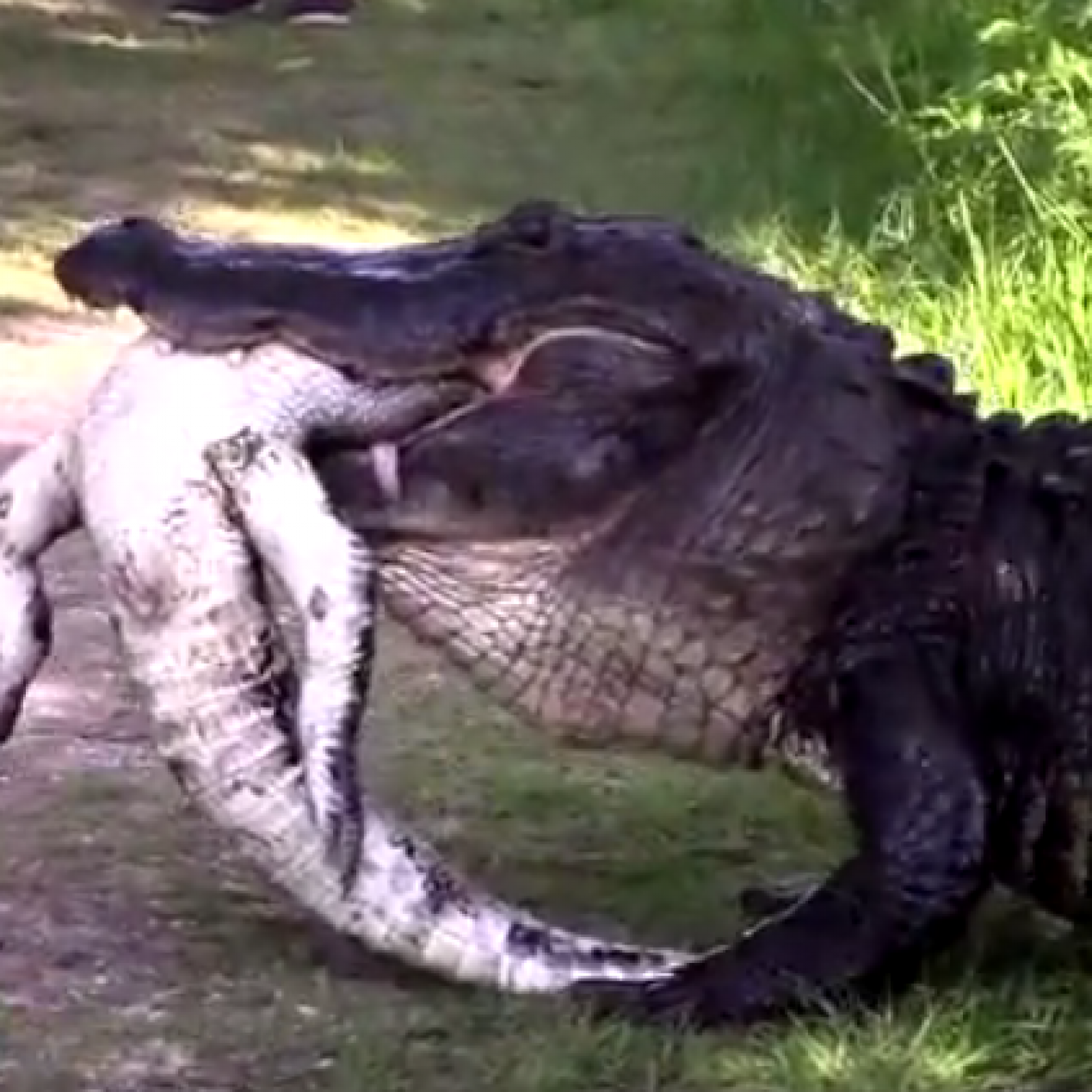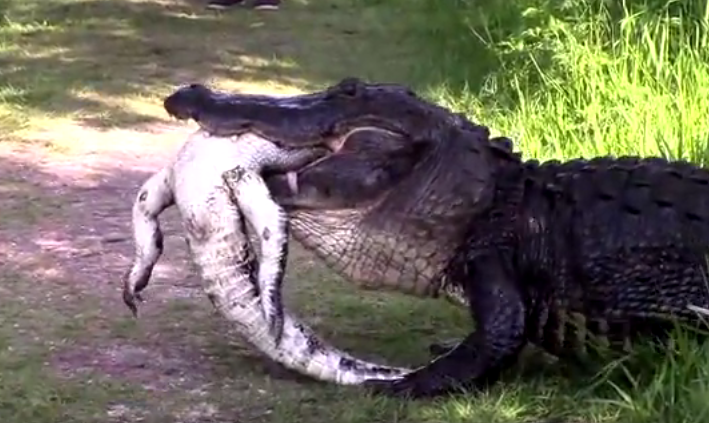Alligators are fascinating creatures that have been around for millions of years. They are notorious for their sharp teeth and powerful jaws, making them one of the most feared predators in the animal kingdom. But have you ever wondered if these creatures are cannibals? Do they eat their own kind? This topic has been a subject of much debate among biologists and animal enthusiasts alike, and it’s time to explore the truth behind this mysterious behavior of alligators.
In this article, we will delve into the world of alligators and explore their eating habits. We will look at scientific studies and observations to determine whether or not alligators are cannibals. From their hunting techniques to their social behaviors, we will uncover the secrets of these fascinating creatures and shed light on one of the most intriguing questions about them. So, let’s dive into the world of alligators and discover if they truly are cannibals.
Alligators are known to be cannibalistic in nature. They have been observed to eat their own species, especially during the breeding season when the competition for mates is high. However, cannibalism is not a regular part of their diet and they mostly feed on fish, turtles, and small mammals.

Are Alligators Cannibals?
Alligators are one of the most fascinating creatures on the planet. They have been around for millions of years and are found in many parts of the world. These reptiles have a reputation for being fierce predators, but are they cannibals? Let’s find out.
What Do Alligators Eat?
Alligators are carnivorous creatures, which means they eat meat. Their diet consists of fish, turtles, birds, and mammals. Alligators are opportunistic feeders, which means they will eat whatever is available to them. They are known to be patient hunters and will wait for hours for their prey to come close enough to attack.
In their natural habitat, alligators are at the top of the food chain. They are apex predators and have no natural enemies. However, there have been instances where alligators have been found eating members of their own species.
Do Alligators Eat Their Own Kind?
Yes, alligators are known to be cannibals. They are not picky eaters and will eat anything that comes their way, even if it is another alligator. This behavior is more commonly observed in younger alligators who are still learning to hunt. They are more likely to attack and eat their own species than older alligators.
There are several reasons why alligators might attack and eat their own kind. One reason could be competition for resources. Alligators are territorial animals, and if they feel their territory is being threatened, they might attack other alligators. Another reason could be for dominance. Alligators are known to be aggressive, and if one alligator feels threatened by another, it might attack and eat it to establish dominance.
Benefits of Alligators Eating Their Own Kind
While the idea of alligators eating their own kind might seem gruesome to us, it is actually beneficial for the ecosystem. Alligators are apex predators, and their diet plays an important role in maintaining the balance of the food chain. By eating weaker or sick alligators, they help prevent the spread of disease and maintain a healthy population.
Additionally, alligators are known to be cannibalistic during times of food scarcity. During droughts or other natural disasters, alligators might resort to eating their own kind to survive. This behavior ensures that the strongest alligators survive and pass on their genes to the next generation.
Alligators vs. Crocodiles
Alligators and crocodiles are often confused for each other, but they are two different species of reptiles. While they look similar, there are some key differences between the two. Alligators have a wider snout and are generally found in freshwater habitats, while crocodiles have a longer, more pointed snout and are found in both freshwater and saltwater habitats.
In terms of behavior, crocodiles are more aggressive than alligators and are known to attack humans more frequently. Alligators, on the other hand, are more docile and tend to avoid humans unless provoked.
Conclusion
In conclusion, alligators are cannibals, but this behavior is not common. They are opportunistic feeders and will eat whatever is available to them. While the idea of alligators eating their own kind might seem gruesome, it is actually beneficial for the ecosystem. Alligators play an important role in maintaining the balance of the food chain, and their diet helps prevent the spread of disease and ensures that the strongest alligators survive.
Frequently Asked Questions
Below are some commonly asked questions about alligators:
1. What do alligators eat?
Alligators are carnivorous and their diet consists of fish, turtles, birds, and small mammals. They are also known to prey on larger animals such as deer and wild pigs. However, they do not typically feed on their own species, although it has been observed in rare cases.
Instances of alligator cannibalism are usually attributed to territorial disputes or hunger during times of scarcity. In most cases, alligators prefer to avoid confrontation with larger individuals of their own kind.
2. How often do alligators eat?
Alligators have a slow metabolism and can go for weeks or even months without eating. The frequency of their meals depends on factors such as temperature, availability of prey, and their size. Juvenile alligators may eat daily, while adult alligators can go for extended periods of time without food.
It is worth noting that alligators do not need to eat as frequently as warm-blooded animals, as their cold-blooded metabolism allows them to conserve energy and survive on less food.
3. Can alligators climb trees?
Alligators are not known for their climbing abilities, as they have short legs and a heavy body. While they can crawl on land and swim in water with ease, climbing trees is not a natural behavior for them.
However, there have been rare instances of alligators climbing small trees or shrubs to bask in the sun or escape predators. This behavior is not common and is usually seen in younger alligators.
4. Are alligators dangerous to humans?
Alligators are wild animals and should be treated with caution and respect. While they are not typically aggressive towards humans, they can become dangerous if they feel threatened or provoked.
It is important to never approach an alligator in the wild, and to avoid swimming or wading in areas where alligators are known to reside. If you encounter an alligator in the wild, give it plenty of space and contact local authorities if necessary.
5. How long do alligators live?
Alligators have a relatively long lifespan, with some individuals living up to 50 years or more in the wild. This can vary depending on factors such as habitat quality, disease, and human interference.
Alligators grow at a slow rate and do not reach sexual maturity until they are around 6 feet in length. After reaching maturity, they can continue to grow throughout their lifetime, with males typically growing larger than females.
Cannibal Crocodile eats smaller crocodile in the Kruger National Park
In conclusion, while alligators are known to be formidable predators, the question of whether they are cannibals is still up for debate. Some studies suggest that alligators have been known to consume their own species, while others argue that these instances are rare and may be influenced by environmental factors. Regardless, it is clear that alligators play a crucial role in maintaining the delicate balance of their ecosystems, and their behavior is closely watched by scientists and conservationists alike.
However, it is important to remember that alligators, like all wild animals, should be treated with respect and caution. Despite their impressive physical abilities, alligators are vulnerable to human activities such as habitat destruction and hunting. As such, it is crucial that we take steps to protect these creatures and their habitats in order to ensure their survival for future generations.
In the end, the question of whether alligators are cannibals is just one small piece of the puzzle when it comes to understanding these fascinating creatures. By continuing to study and learn about alligators and their behaviors, we can gain a greater appreciation for the complexity and beauty of the natural world.


